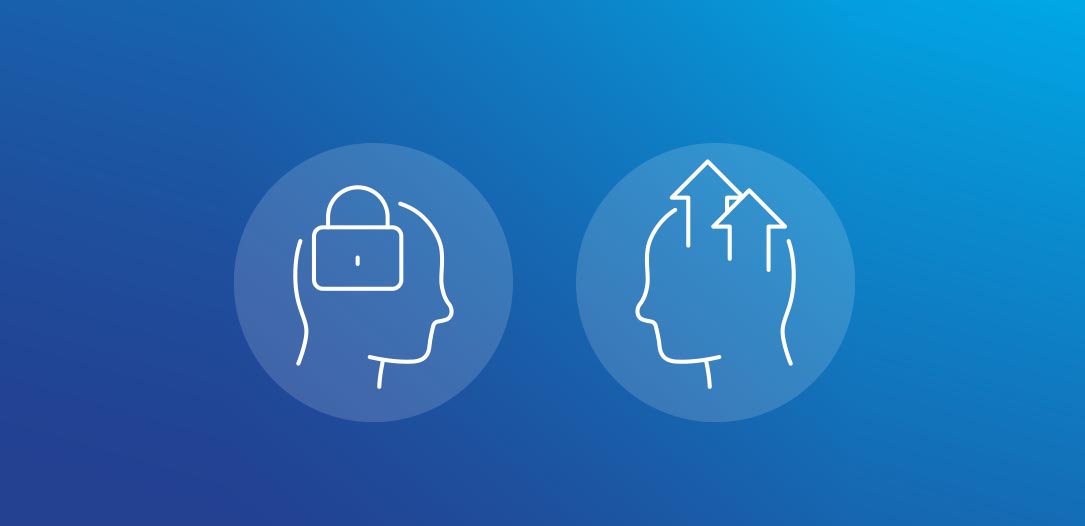Inevitably, in IT we keep learning new things all through our careers to be able to keep up with the ever changing digital future. This is no different from other branches, I’m sure. Personally, I believe that we should not only keep improving our technical skills. Improving our soft skills, or ‘personal’ development, is at least as importance.
At Rubix we love integration and everything that surrounds this area of expertise. But we also like to challenge our minds with subjects that are less related to the digital world. Every year, we have several non-technical trainings to improve ourselves on a personal level. From an interesting list of non-technical trainings, for this year I chose ‘Fixed vs. Growth Mindset’. True to my developer’s nature I of course googled the subject, and found it too interesting to not share in a blog.
What it is?
Fixed Mindset
So what is a Fixed Mindset? In short, a fixed mindset is when you think you are limited by your talent, or the lack of it. You are convinced that your basic skills have their limits. Afraid to make mistakes, and thereby proving you can’t do any better, you won’t venture far outside of what you already know.
Growth mindset
Then there’s the Growth Mindset, which entails that you believe that putting in the effort will create the desired result or, at least will make you better at what you are willing to achieve.
Maybe the best Growth Mindset quote in the world comes from the little red-haired girl called Pippi Longstocking. She spoke the famous words:
“I have never tried that before, so I think I should definitely be able to do that”
Another great example of a Growth Mindset comes from my all-time basketball hero Michael Jordan: https://youtu.be/W3FCbP8rdRU. “I have failed over and over again in my life, and that’s why I succeed!”
Characteristics
A Fixed Mindset
- The Brain is static
- Reward according to result
- Intelligence determines the result
- What will others think of my work
- Talent is a gift
- Save face
- Focus on personal status and winning
- Asking for help is a sign of weakness
A Growth Mindset
- The Brain is elastic
- Reward according to effort
- Effort determines the result
- What can I learn from this task
- Talent can be developed
- Struggle and grow
- Focus on growth and challenge
- Asking for help is a chance to learn to do better
The science behind it
Primal, Limbic and Modern Brain
Our originally fixed mindset comes from way, way back. Prehistorically, we were programmed to survive in dangerous situations. Thanks to your primal brain, you’re still alive! First there is a physical reaction, then an emotional reaction and then a Fight, Flight or Freeze reaction.
Second, there is the Limbic brain, which supports functions like emotion, behaviour, long-term memory and olfaction, the sense of smell.
Third, there is the Modern brain, the Cortex. Without turning this blog into a biology lesson: the Cortex is responsible for problem solving, memory, language, judgment, impulse control, and reasoning. This ‘third brain’ is strongly related, or can be strongly related to the Growth Mindset.
Daniel Kahneman
The Israeli psychologist and economist Daniel Kahneman, well-known for his work on the psychology of judgement and decision-making, found that there are two systems in our brain. Thinking fast (system 1) and thinking slow (system 2).

The more you know about system 1, the more influence you can have over system 2. This is also an important aspect of the Growth Mindset. If you learn to slow down the impulsive reaction of system 1… well, you catch my drift.
Related to these systems there is Relational Emotional Behaviour Therapy, which guides the adoption of renewal. By changing your thoughts about occurring events, you can change your (re)action on these events and therefore change the impact these events will have on you.

Carol Dweck
Born in 1946, this American psychologist, who has been a Psychology professor at Universities since 1972, specialises in Social and Developmental Psychology and foremost Mindset. Dweck separates Fixed and Growth Mindset as follows:
If people believe that their basic abilities are fixed, they will have more difficulties handling challenging situations. They are careful because they are afraid something can go wrong. They believe that their development potential is limited and intelligence is a fixed situation.
People with a growth mindset believe that basic skills can be developed and they can learn from what overcomes them and it will make them stronger. Dweck argues that the Growth Mindset will allow a person to live a less stressful and more successful life.
Establish a Growth Mindset
With all this information in mind, how can we establish a Growth Mindset? And how can we encourage others to do the same?
As with many things, trying to establish a Growth Mindset is also a Mindset. What is there to lose? Just do it and don’t be afraid to fai… GROW!
There is a LOT of interesting information to find about the mind, your thoughts, emotions and how it all works together or sometimes (or rather often…) against you. I’d like to challenge you the next time you are ‘afraid’ to fail or when you are looking up to a task at work or even at home, to see it as an opportunity to grow and learn!
Keep these things in mind along the way 
- Approach every challenge as a learning experience.
- Find inspiration in other people’s success.
- Don’t be afraid to take risks. Try to see a mistake as learning, not failing.
- Don’t seek approval from others, but see it as your own path to growth.
- Think of feedback / criticism as a way to improve.
- Acknowledge and embrace imperfections.
- Value the process over the end result.
- Reward actions, not traits.
- Use the word ‘Yet’. If you see a colleague struggle, tell them they haven’t mastered it ‘yet’ but they are doing a great job and the effort will pay off.
- Once you developed a Growth Mindset, acknowledge that you possess it and be proud of it!




